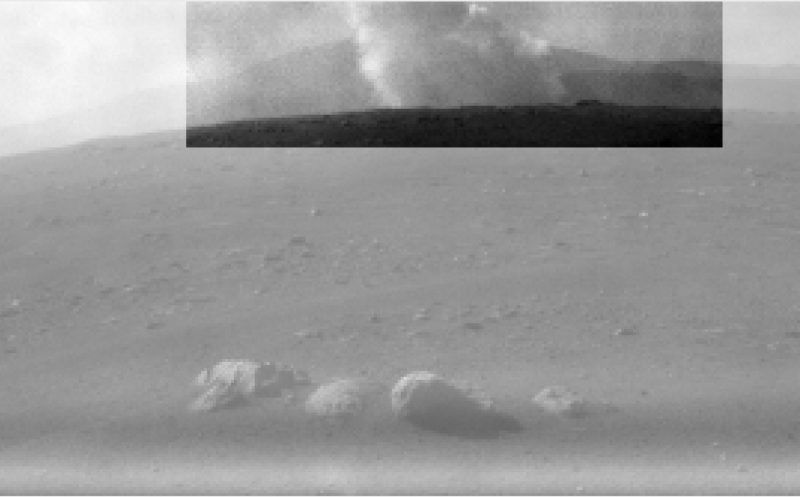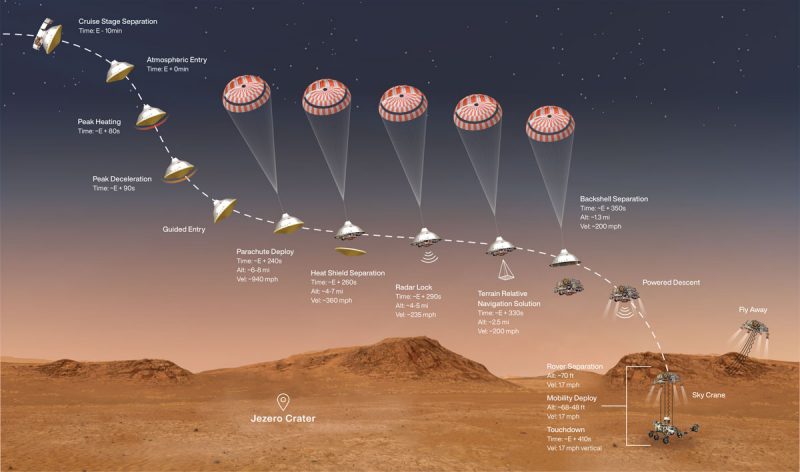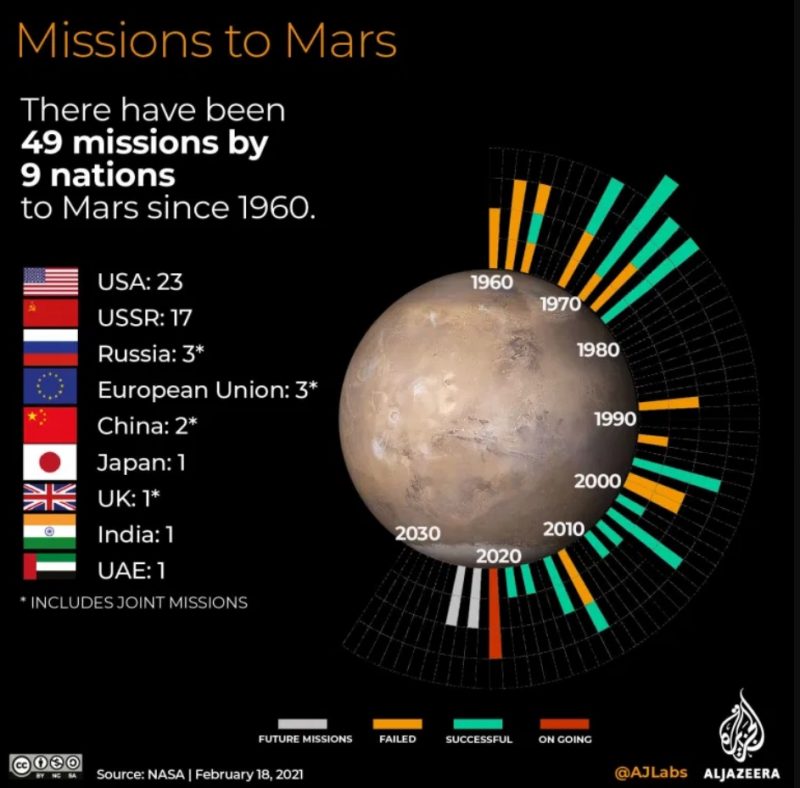

The Mars rover Perseverance captured a photo on February 18, 2021 of its own descent stage crashing onto Mars’ surface and triggering a plume of smoke. Image via NASA.
One of the coolest shots we’ve seen from Perseverance on Mars so far came from the day of its successful landing, February 18, 2021. Minutes after landing, Perseverance managed to look off into the distance and capture an image of its own descent stage crash landing on Mars’ surface.
What’s the descent stage? Its role in Perseverance’s landing was brief, but vital. The descent stage is the rocket-powered section that deployed after the parachute. It was needed in part because Mars’ atmosphere is so thin that parachutes alone can’t guarantee a soft-enough landing. The descent stage kept the rover steady just above Mars’ surface, as the rover was deployed to Mars’ surface via cables. The descent stage wasn’t designed to land safely. After deploying the rover, it flew some distance off and crashed itself. That’s what Perseverance captured in this image.
Perseverance is busy on Mars examining its environs and recording all that it sees. It reports its findings with an anthropomorphized – and adorable – Twitter account @NASAPersevere. Its tweet about the descent stage crash landing was one of its first.
A moment of respect for the descent stage. Within two minutes of safely delivering me to the surface of Mars, I caught the smoke plume on one of my Hazcams from its intentional surface impact — an act that protected me and the scientific integrity of my landing site. pic.twitter.com/bG4dekrbvJ
— NASA's Perseverance Mars Rover (@NASAPersevere) February 24, 2021

Artist’s concept illustrating Perseverance’s landing on Mars, via NASA.
As you may have heard by now – or realized yourself – Mars is the only planet we know that’s populated by robots! A total of 18 spacecraft have been put in orbit around Mars, eight of which are still operating. Of the Mars’ rovers sent to Mars’s surface, five are still operational: Sojourner, Spirit and Opportunity, Curiosity, and Perseverance.
One Mars orbiter, the European Space Agency’s ExoMars Trace Gas Orbiter, also captured Perseverance on Mars’ surface, at its landing spot. It managed to find the rover and the pieces shed on descent, then tweeted an image:
There you are @NASAPersevere! I finally got the chance to take a photo of you in your new home ? #CountdownToMars
? @ExoMars_CaSSIS https://t.co/Zl2FhZ2Z8q #ExploreFarther #Mars pic.twitter.com/1CoOrs1r1S— ExoMars orbiter (@ESA_TGO) February 25, 2021
The rover is near the bottom center of the image, with the heat shield a dark circular spot in the upper right, the descent stage to the left (and in the plume photo above), and the white parachute and back shell bright on the surface at far left. You can see from the overhead view the large ridge between the rover and the descent stage that the rover is looking toward in the top image.
Since 1960, nine countries have sent missions either to orbit Mars or attempt to land on its surface, and many of them have crashed and burned, quite literally.
February 2021 saw three missions successfully make it to Mars, both in orbit and on the surface. Perseverance was one. The other two were the UAE’s Hope mission and China’s Tianwen-1.

Many spacecraft have tried to land on Mars, few have succeeded. Image via Al Jazeera.
Bottom line: NASA’s Mars rover Perseverance tweeted a photo of the resulting plume of smoke from the impact of the descent stage.
from EarthSky https://ift.tt/3pWa50U


The Mars rover Perseverance captured a photo on February 18, 2021 of its own descent stage crashing onto Mars’ surface and triggering a plume of smoke. Image via NASA.
One of the coolest shots we’ve seen from Perseverance on Mars so far came from the day of its successful landing, February 18, 2021. Minutes after landing, Perseverance managed to look off into the distance and capture an image of its own descent stage crash landing on Mars’ surface.
What’s the descent stage? Its role in Perseverance’s landing was brief, but vital. The descent stage is the rocket-powered section that deployed after the parachute. It was needed in part because Mars’ atmosphere is so thin that parachutes alone can’t guarantee a soft-enough landing. The descent stage kept the rover steady just above Mars’ surface, as the rover was deployed to Mars’ surface via cables. The descent stage wasn’t designed to land safely. After deploying the rover, it flew some distance off and crashed itself. That’s what Perseverance captured in this image.
Perseverance is busy on Mars examining its environs and recording all that it sees. It reports its findings with an anthropomorphized – and adorable – Twitter account @NASAPersevere. Its tweet about the descent stage crash landing was one of its first.
A moment of respect for the descent stage. Within two minutes of safely delivering me to the surface of Mars, I caught the smoke plume on one of my Hazcams from its intentional surface impact — an act that protected me and the scientific integrity of my landing site. pic.twitter.com/bG4dekrbvJ
— NASA's Perseverance Mars Rover (@NASAPersevere) February 24, 2021

Artist’s concept illustrating Perseverance’s landing on Mars, via NASA.
As you may have heard by now – or realized yourself – Mars is the only planet we know that’s populated by robots! A total of 18 spacecraft have been put in orbit around Mars, eight of which are still operating. Of the Mars’ rovers sent to Mars’s surface, five are still operational: Sojourner, Spirit and Opportunity, Curiosity, and Perseverance.
One Mars orbiter, the European Space Agency’s ExoMars Trace Gas Orbiter, also captured Perseverance on Mars’ surface, at its landing spot. It managed to find the rover and the pieces shed on descent, then tweeted an image:
There you are @NASAPersevere! I finally got the chance to take a photo of you in your new home ? #CountdownToMars
? @ExoMars_CaSSIS https://t.co/Zl2FhZ2Z8q #ExploreFarther #Mars pic.twitter.com/1CoOrs1r1S— ExoMars orbiter (@ESA_TGO) February 25, 2021
The rover is near the bottom center of the image, with the heat shield a dark circular spot in the upper right, the descent stage to the left (and in the plume photo above), and the white parachute and back shell bright on the surface at far left. You can see from the overhead view the large ridge between the rover and the descent stage that the rover is looking toward in the top image.
Since 1960, nine countries have sent missions either to orbit Mars or attempt to land on its surface, and many of them have crashed and burned, quite literally.
February 2021 saw three missions successfully make it to Mars, both in orbit and on the surface. Perseverance was one. The other two were the UAE’s Hope mission and China’s Tianwen-1.

Many spacecraft have tried to land on Mars, few have succeeded. Image via Al Jazeera.
Bottom line: NASA’s Mars rover Perseverance tweeted a photo of the resulting plume of smoke from the impact of the descent stage.
from EarthSky https://ift.tt/3pWa50U

Aucun commentaire:
Enregistrer un commentaire